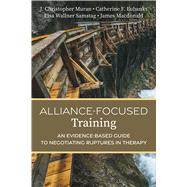This book presents alliance-focused training (AFT), which helps therapists better anticipate, recognize, and repair ruptures in the therapeutic alliance.
Decades of clinical research and experience have proven the essential contribution of the therapeutic alliance to psychological change and positive outcomes in therapy. A key element of a successful alliance is the ability to anticipate and navigate the inevitable misunderstandings and miscommunications that can lead to ruptures in the therapeutic relationship if unaddressed. But many therapists lack this ability, and they require training to fully address ruptures and repair therapeutic relationships with their clients.
In this book, authors J. Christopher Muran, Catherine F. Eubanks, Lisa Wallner Samstag, and James Macdonald present alliance focused training (AFT), an empirically-supported, transtheoretical protocol which has been shown to increase patients’ expressiveness, which is a key component in positive outcomes in therapy, as well as therapists’ ability to recognize and tolerate their own negative reactions to clients. In AFT, therapists are given the opportunity to experiment with metacommunication, by which they can better explore their own internal experience and recognize conflicts as they emerge during alliance ruptures. Chapters first describe the background and research that led to the development of the protocol; next, the protocol itself is presented, with chapters on rupture recognition and rupture repair, via didactic instruction and experiential exercises. Then, rich and extensive case examples demonstrate how therapists can successfully use the protocol to identify and repair real ruptures with clients, and lead to long-lasting therapeutic change.









